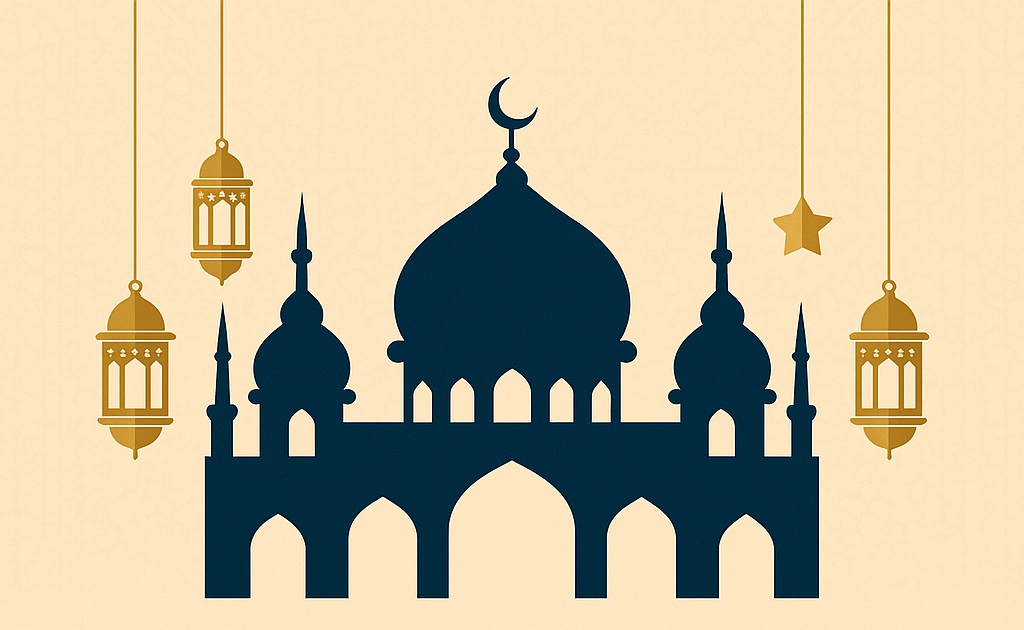Welcoming Muharram:
A Month of Peace, Sacrifice, Reflection, and Unity
Introduction
As the delicate crescent moon of Muharram is sighted, it heralds the dawn of a new Islamic year, stirring hearts with a poignant blend of reverence and sorrow. The Muharram and Day of Ashura, the 10th of Muharram, holds a sacred place in Islam, its spirit woven with the threads of peace, sacrifice, and unity. The month of Muharram is succeeded by the month of Dhul Hijjah (Click here to review our Blog regarding “Hajj”, performed in the month of Dhul Hijjah) , both of which are revered as sacred months in Islam.
This isn’t just the start of the Islamic New Year—it’s the beginning of a deeply meaningful story. This special month carries tales of strong faith, unwavering courage, and powerful spirituality. At its core lies the Battle of Karbala, where Hazrat Imam Hussain ibn Ali (RA) stood tall against tyranny, offering not only his life but the lives of his family for the sake of justice and truth.
In the desert of Karbala, the world witnessed not just a physical battle, but a moral revolution. Hazrat Imam Hussain’s martyrdom turned this sacred month into a canvas of sacrifice, reflection, and unity, etched deeply into the soul of every believer.
Importance & History of Youm e Ashura
The term “Ashura” derives from the Arabic word “Asharah,” meaning “ten,” reflecting its occurrence on the 10th day of Muharram. Its significance predates Islam, as the day was revered in pre-Islamic Arabia and among Jewish communities. Below are the few prominent historical events tied to Ashura
Liberation of Prophet Moses (Musa) and the Israelites from the tyranny of Pharaoh in Egypt
Prophet Moses (Musa), peace be upon him, was divinely chosen to lead the Israelites out of Pharaoh’s oppressive rule in Egypt. With Allah’s guidance and miracles, such as the parting of the Red Sea, Hazrat Musa (AS) delivered his people to safety, escaping Pharaoh’s tyranny. This event stands as a powerful testament to Allah’s mercy and ability to liberate the oppressed from injustice.
A New Beginning for Prophet Nuh (AS)
Prophet Nuh (Noah), peace be upon him, tirelessly called his people to worship Allah alone, but they rejected him. Following Allah’s command, Nuh built an ark, and when the great flood engulfed the earth, He and his followers, and representatives of every animal were saved. The Day of Ashura was also significant in the time of prophet Hazrat Nuh (AS), some narrations say that on the day of Ashura, Allah returned His arc back to dry land after the flooding stopped. It was a day of relief and celebration for the Prophet and his devoted companions.
Prayer Of Hazrat Adam (AS) accepted
After disobeying Allah by eating from the forbidden tree, Hazrat Adam (AS), Hazrat Hawwa (Eve) were sent to Earth. Overwhelmed with regret, He sincerely repented, seeking Allah’s forgiveness through heartfelt prayer. Allah, in His infinite mercy, accepted Adam’s repentance, guiding him and demonstrating the transformative power of sincere remorse. The Day of Ashura marks the occasion when Prophet Adam (AS) sincerely repented and received Allah’s forgiveness.

Hazrat Yunus (AS) was freed from the whale's belly
Hazrat Yunus (AS), was swallowed by a whale after leaving his people in despair. In the depths of the whale’s belly, he turned to Allah. The Day of Ashura was also the day that Prophet Yunus (AS) was released from the belly of the whale and Allah forgave his people.
Above All the Youm e Ashura is remembered for;
The Battle of Karbala
The most significant event that occurred in the month of Muharram was the Battle of Karbala, which took place in Iraq in Muharram 61 AH.
Hazrat Imam Hussain (RA), the cherished grandson of our beloved Prophet Muhammad (PBUH), courageously resisted Yazid’s illegitimate rule. Fully aware of the consequences, he upheld the truth with unwavering faith. His journey from Medina to Karbala was not only for power—it was a mission to awaken the sleeping conscience of a nation.
Accompanied by only 72 loyal companions, mainly consisting of the members of the family of the Prophet (PBUH). Hazrat Imam Hussain (RA) arrived at the barren land of Karbala. Surrounded by thousands of enemy soldiers, under the scorching sun, he stood firm—a symbol of resilience in the face of cruelty.
On the 10th of Muharram, known as Ashura, the land of Karbala was drenched not just in blood, but in dignity, courage, and love. One by one, Hazrat Imam Hussain’s companions fell. His sons, brothers, nephews—even his 6-month-old son, Hazrat Ali Asghar, were brutally martyred.
Yet, Hazrat Imam Hussain never wavered. His final stand, wounded and alone, is a testament to what it means to live and die with purpose. With his last breath, he uttered words of faith, surrendering his soul to the Almighty.
Hazrat Imam Hussain (RA) was extremely close to and precious to the Our beloved Holy Prophet (SAW). As a child, he would climb on the Prophet (SAW)’s back freely during prayer, and was beloved to him.

Fasting on the Day of Ashura
Many of us might don’t know that the 10th of Muharram, called Youm-e-Ashura, was special even before Islam. The Quraish in Makkah and the Jews used to fast on this day, feeling its deep importance.
The scholars of Islam consider it recommended to fast on the 9th of Muharram along with the 10th of Muharram (‘Ashura). This is due to the Hadith:
When the Messenger of Allah (pbuh) fasted on the day of ‘Ashura and told the people to fast, they said, “O Messenger of Allah, this is a day that is venerated by the Jews and Christians.” The Messenger of Allah (pbuh) said, “Next year, if Allah wills, we will fast on the ninth day.” But by the time the following year came, the Messenger of Allah (pbuh) had passed away.
Some of the Islamic scholars also considered fasting on the 11th of Muharram to be recommended. This could be if one misses the 9th or it could be in order to ensure one catches the 10th of Muharram. Therefore, it is virtuous to fast:
- Just the day of 10th Muharram
- Or the 9th and 10th,
- Or to fast the 10th and 11th.
- Some scholars would even fast the 9th, 10th and 11th of Muharram.
Any one of these options is recommended. Click Here to read more details of Fasting on the day of Ashura.
Reflection: A Mirror to Our Own Souls
Muharram encourages everyone to stop and think. Are we being fair in our everyday actions? Are we speaking out against unfair treatment, even if it’s small? The story of Karbala continues when we choose kindness instead of cruelty, honesty instead of lies, and bravery instead of staying quiet.
Spiritual Lessons from Karbala:
- Stand for Truth: Even if you stand alone, never abandon what’s right.
- Value of Patience:Hazrat Imam Hussain’s calmness under unimaginable pain teaches us resilience.
- Faith Over Fear: Karbala wasn’t about defeat—it was about eternal victory of the spirit.
Conclusion
Muharram is not just a historical memory—it is a spiritual awakening. Hazrat Imam Hussain’s (RA) sacrifice was not for a crown, a kingdom, or recognition. His stand was not for power or fame, but a noble defense of truth, dignity, and the essence of faith for generations to come.
As we embrace Muharram, let us not only reflect—let us rise. Let our emotions fuel a resolve to stand against injustice. Let the stories we hear spark a fire in our hearts to uphold truth and justice.



